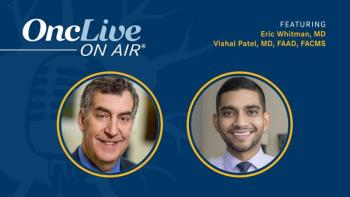
FDA Approval Insights: Nivolumab/Ipilimumab in Advanced NSCLC
In our exclusive interview, Suresh S. Ramalingam, MD, discusses the FDA approval of nivolumab plus ipilimumab for the first-line treatment of patients with metastatic non–small cell lung cancer.
Welcome to a very special edition of OncLive® On Air! I’m your host today, Caroline Seymour.
OncLive® On Air is a podcast from OncLive, which provides oncology professionals with the resources and information they need to provide the best patient care. In both digital and print formats, OncLive covers every angle of oncology practice, from new technology to treatment advances to important regulatory decisions.
Today, we had the pleasure of speaking with Suresh S. Ramalingam, MD, deputy director of Winship Cancer Institute of Emory University, to discuss the recent FDA approval of nivolumab (Opdivo) plus ipilimumab (Yervoy) for the first-line treatment of patients with metastatic non–small cell lung cancer (NSCLC).
On May 15, 2020, the FDA approved the combination for use in patients whose tumors do not harbor EGFR or ALK genomic tumor aberrations, and whose tumors express a PD-L1 level of at least 1%, as determined by an FDA-approved test. The FDA simultaneously approved the PD-L1 immunohistochemistry 28-8 pharmDx test as a companion diagnostic for identifying appropriate patients to receive the dual immunotherapy regimen.
The approval is based on findings from the multi-part, phase 3 CheckMate-227 trial, in which investigators evaluated first-line nivolumab-based regimens versus platinum-doublet chemotherapy in patients with advanced NSCLC across nonsquamous and squamous histologies.
In part 1a of the study, nivolumab plus low-dose ipilimumab or nivolumab alone was compared with chemotherapy in patients with PD-L1–positive NSCLC. In part 1b, nivolumab, low-dose ipilimumab, and chemotherapy was compared with chemotherapy alone in patients whose tumors do not express PD-L1.
In part 2 of CheckMate-227, nivolumab plus chemotherapy was compared with chemotherapy alone in patients with advanced NSCLC, regardless of PD-L1 expression.
Nivolumab was administered at 3 mg/kg every 2 weeks, and in the combination arm, 1 mg/kg of ipilimumab was given every 6 weeks. Treatment was administered until disease progression, unacceptable toxicity, or for up to 2 years.
In the cohort of patients with at least 1% PD-L1 expression, the 1- and 2-year overall survival (OS) rates were 63% and 40%, respectively, with nivolumab/ipilimumab and 56% and 33%, respectively, with chemotherapy.
An exploratory analysis was conducted in the combination arm, the single-agent nivolumab arm, and the chemotherapy-alone arm in patients whose tumors had a PD-L1 expression of at least 1%. Here, the median OS was 17.1 months, 15.7 months, and 14.9 months, respectively. Additionally, the 1-year OS rates for the combination, nivolumab, and chemotherapy were 63%, 57%, and 56%, respectively. The 2-year OS rates were 40%, 36%, and 33%, respectively.
Grade 3/4 treatment-related adverse events were reported in 32.8%, 19%, and 36.0% of patients in the nivolumab/ipilimumab, single-agent nivolumab, and chemotherapy arms, respectively.
In our exclusive interview, Dr. Ramalingam, who is also a professor in the Department of Hematology and Medical Oncology and the Roberto C. Goizueta Distinguished Chair for Cancer Research at Emory University School of Medicine, shed light on key findings from the CheckMate-227 trial. He also discussed the impact of the approval on other frontline treatment regimens in the metastatic setting and highlighted ongoing research with immunotherapy in the field.




































